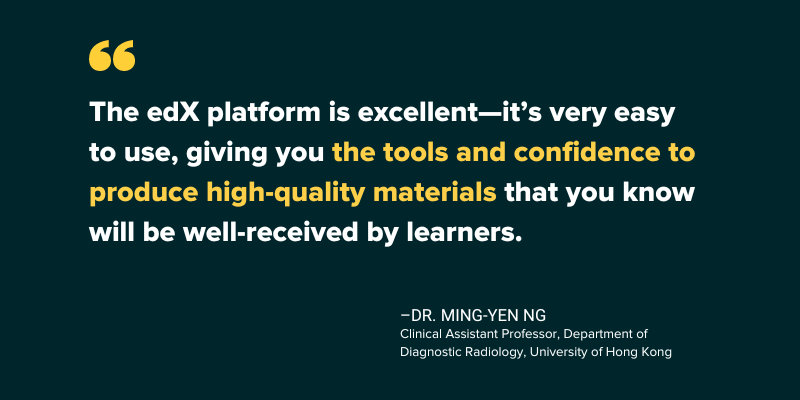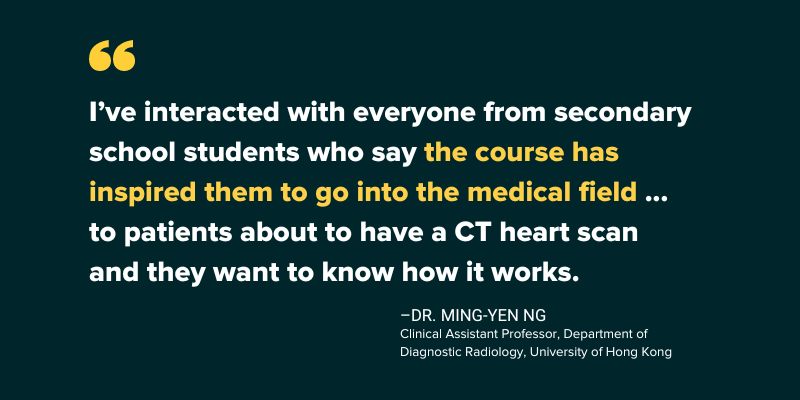Bridging Cultures with Heart: How the University of Hong Kong Is Improving Healthcare with a Cardiac Imaging Course
Find out how the university became a finalist for the 2021 edX Prize by bringing together professional-grade video, interactive games, and more to help make cardiac computed tomography training more readily available to the global medical community.
Helping professionals acquire vital skills. Inspiring future generations of learners. Bridging gaps between cultures. Broadening one’s professional network. For Dr. Ming-Yen Ng, a clinical assistant professor in the Department of Diagnostic Radiology at the University of Hong Kong (HKU), these are just a few of the many rewards that can come from developing a Massive Open Online Course (MOOC) on edX. Above all these benefits, Dr. Ng adds one more:
“That childhood ambition we have growing up—to try and make the world a better place—can be a reality through a platform like edX,” he says.
Dr. Ng would know—as the course director for HKU’s edX Prize-nominated course on Advanced Cardiac Imaging: Cardiac Computed Tomography (CT), he has created what is considered the first comprehensive MOOC dedicated to helping medical professionals meet the Society of Cardiovascular Computed Tomography’s “Level One” accreditation requirements for scanning patients using cardiac CT technology and interpreting the results. Last year, the course won the QS Reimagine Education Gold Award in Life Sciences and was also a finalist for the edX Prize.
Discovering the Need for More Accessible, Hands-On Training
When Dr. Ng first began working at HKU’s affiliated teaching facility, Hong Kong’s Queen Mary Hospital, part of his role involved regularly crossing the border into China to help with cardiac imaging services at another hospital. Through that experience, Dr. Ng discovered the region’s general lack of cardiac CT training beyond theoretical education.
“A structured curriculum that teaches Level One requirements didn’t really exist anywhere,” he says. “Even at large hospitals in Beijing and Shanghai, most medical teams learn it from their bosses, so the transfer of knowledge completely depends on how much their superiors know.”
Of the relevant educational content Dr. Ng did find, most of the material were long-winded lectures recorded at conferences with varying degrees of audio and video quality. Nearly all the lectures were in English, which most of Dr. Ng’s Chinese colleagues struggle with. And the cost for his colleagues to access these videos would simply be too high, even with discounts through a membership to an imaging society.
“I realized I needed to help make cardiac CT training more readily and freely available to the broader medical community—and in a way that also addressed the language barrier,” he says.
One fateful day in 2018, Dr. Ng shared an elevator with Ricky Kwok, a former HKU professor and head of the university’s Technology-Enriched Learning Initiative (TELI), whose responsibilities included creating videos for online learning platforms, including MOOCs on edX. Dr. Ng had begun experimenting with blended in-person and online learning in his teaching, so Kwok suggested he apply for university funding to create a MOOC about cardiac CT. With full knowledge of the need to increase access to a course such as his, Dr. Ng jumped on the opportunity. Once approved, he found himself working with a team of dedicated instructional designers, animators, and videographers to help create the course’s multimedia content.
“I found the whole experience really enjoyable, and I learned a lot,” he says. “The edX platform is excellent—it’s very easy to use, giving you the tools and confidence to produce high-quality materials that you know will be well-received by learners. The edX team is also very open to suggestions and discussions. I was just so impressed with their skill sets and professionalism.”
Interactive, Low-Risk Simulations—All Online
One of the highlights of HKU’s cardiac CT course are the professional-grade video lessons led by medical experts from all over the world, including the U.S., UK, Canada, and China. HKU flew all of these cardiac CT specialists to Hong Kong so that the videos would set learners up for success with a consistent, integrated look and approach. The videos are intentionally broken up into digestible chunks of five to seven minutes each and translated into several languages, including Chinese and French.
An additional aspect of the course that excites Dr. Ng is all of the interactive games.
“These games, which give learners hands-on practice to reinforce their learning, are something I haven’t seen much of in other cardiac imaging programs,” he says. “We developed these activities to simulate different patient scenarios so that learners can explore and experiment without real-life consequences if they make a wrong choice. This approach is especially important, given we’re talking about one of the body’s most vital and complex organs.”
As an example, Dr. Ng points to a game that teaches learners how to safely administer medication to patients in order to slow down the heart rate to get a CT heart scan with high-quality images.
“If a patient’s heart is beating too fast, by the time the x-ray gun within the scanner has rotated around the patient, the heart will be in a different position between the beginning and end, compromising the image’s quality,” he explains. “The challenge is a bit like needing to take pictures of a speeding car on a race course, but you slow the car down to take them. Right after learners watch a video on contrast agents and drugs, we give them hands-on practice with a game in which they choose a combination of medications and doses to administer based on different patient profiles and known medical issues. The game saves hospitals a lot of time and money because, for radiologists and cardiologists, this isn’t something typically learned in medical school or even in their first year after graduating.”
Making an Impact in Unexpected Places
Ever since HKU’s cardiac CT course launched on edX in July 2020, Dr. Ng has received message after message from the global medical community, thanking him for how helpful the course has been to their daily work and as an ongoing reference manual. There have also been learners he didn’t expect to hear from.
“I’ve interacted with everyone from secondary school students who say the course has inspired them to go into the medical field, to a father and young son learning together, to patients about to have a CT heart scan and they want to know how it works,” he says.
One of the most rewarding messages Dr. Ng received was from a cardiologist in Algeria, Dr. Abderrahmane Mekkaoui. “He expressed how much of an impact the course is having in his community, where access to free quality education is rare and fellowships that include this training are hard to come by,” Dr. Ng recalls. “Based on what they learned from the course, he and his radiology colleague set up a cardiac imaging facility that offers much-needed services for patients and hospitals in their region at an affordable cost. His message came as a real blessing to me, to hear I’m helping improve patient care around the world like this. It’s why I’m such a strong believer in online education through edX.”
Dr. Ng cites the course’s success as one likely reason he now has HKU funding for a third course in the cardiac imaging series, to complement the CT and MRI modules that make up the university’s Professional Certificate in Advanced Cardiac Imaging. He sees a lot of value in adding echocardiogram technology, also known as ultrasound, to the training sequence.
“Eventually adding echo to the certificate lets us offer training in a more holistic way,” he explains. “Of all these technologies, echo is the most commonly used—it’s one of the first points of call from a cardiologist’s point of view. Clinicians need to understand the different strengths and weaknesses of these three imaging modalities, so bringing them together will help medical teams connect the dots and better determine when to use one modality versus another.”
Educator, Dreamer, and Learner in One
Beyond helping the greater medical community and heart patients around the world, Dr. Ng also acknowledges how being nominated for the edX Prize has enhanced his career.
“When HKU said they wanted to submit the cardiac CT course for consideration, I was really surprised,” he says. “And then when it was announced as a finalist, I was over the moon—but at the same time, I felt like a charlatan amid all the other nominees. Now I see the recognition as the cherry on top because it has opened up a lot of networking connections and given me the opportunity to dream up other projects with so many amazing people.”
“I just hope this course stimulates others to keep upping the game in online education,” Dr. Ng continues. “If you’re an educator, I strongly encourage you to create something on edX because there’s so much to learn. edX is very invested in making sure your material is the best it can be, which takes a lot of the worry out of the process. I’ve even been inspired to take courses on edX for myself. Doctors want to have fun and learn new things, too!”
~~~
Discover the stories of other edX Prize-nominated courses, including Mechanical Ventilation for COVID-19 from Harvard University, The Hook, the Bait, and the Fish: Approaches to Teaching Thinking from IsraelX, and Exploring Volcanoes and Their Hazards: Iceland and New Zealand from last year’s winners, the University of Canterbury.
Related Content: Partner Impact



